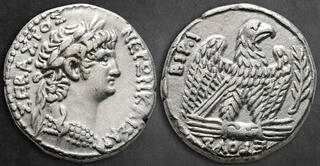| Savoca Numismatik GmbH & Co. KG > Online Auction 188 | Black | Auction date: 17 December 2023 |
| Lot number: 54 Price realized: 340 EUR (Approx. 374 USD) Note: Prices do not include buyer's fees. | Show similar lots on CoinArchives Find similar lots in upcoming auctions on |
| Lot description: Seleucis and Pieria. Antioch. Nero AD 54-68. RY 10, CE 112 = 63-64 AD Tetradrachm AR 25 mm, 15,16 g ΝΕΡΩΝ ΚΑΙΣΑΡ ΣΕΒΑΣΤΟΣ, laureate head of Nero to right, wearing aegis / ETOΥΣ - ΒIP•I, Eagle with spread wings standing right on thunderbolt; to right, palm frond. . McAlee 265b; Prieur 89; RPC I (2 Specimens). NGC graded Ch XF Strike 5/5 Surface 2/5 Born in AD 37, Nero was the son of Agrippina the Younger, sister of Emperor Caligula, who strategically ensured Nero's prominence in the line of succession by marrying Emperor Claudius. Adopted by Claudius, Nero, originally named Lucius, ascended to the throne at the age of 16 following Claudius' assassination. Nero received a solid education, including instruction from the philosopher Seneca. Known for his love of art and theater, Nero married Octavia, Claudius' daughter and his stepsister, at the age of 16. Despite initially positive and peaceful years, Nero's extravagant lifestyle and squandering of resources led to discontent. He faced mockery for participating in singing competitions and the Olympic Games, often securing victories through bribery. Nero divorced Octavia, banished, and eventually murdered her, with his mother pulling the strings behind the scenes. Nero resisted his mother's influence and had her murdered in AD 59. He was implicated in the poisoning of Britannicus in 55 AD, and his rule witnessed numerous conspiracies and executions. During his reign, Nero's forces defeated the Parthians in Armenia and quelled a rebellion in Britain. The Great Fire of Rome in AD 64 prompted rumors that Nero orchestrated it to rebuild the city and create space for the Golden Palace (Domus Aurea). To deflect blame, Nero scapegoated Christians, initiating brutal persecution and executions. The fire was likely accidental, given Rome's frequent occurrences of smaller blazes. Facing declining popularity, Nero lost support from the Senate, former Praetorian Guard allies, and provincial governors. Nero attempted to flee but was abandoned by his guards. He took his own life with a dagger. Galba, the governor of Hispania Tarraconensis, was proclaimed the new emperor, marking the start of the Year of the Four Emperors in AD 69. From the Matteo Savoca collection Starting price: 1 EUR |  |


